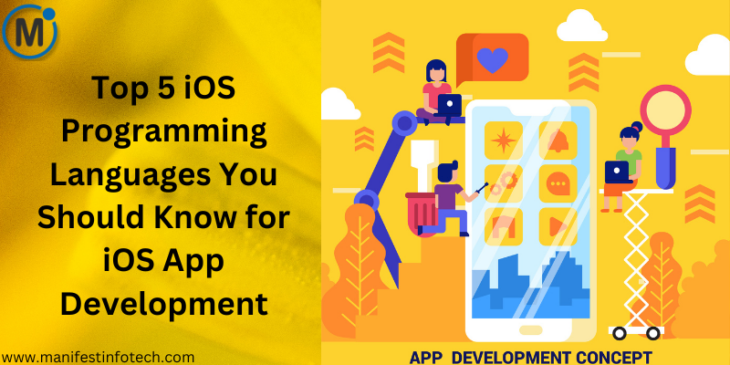
In this blog post, we’ll explore the top five iOS programming languages you should know for iOS app development.
𝟏. 𝐒𝐰𝐢𝐟𝐭:
Swift has rapidly become the go-to programming language for iOS app development since its introduction by Apple in 2014. Designed to be modern, fast, and safe, Swift offers a concise syntax and powerful features that make it ideal for building robust and scalable iOS apps. With features like optionals, type inference, and generics, Swift streamlines the development process and enhances code readability. Whether you’re developing a simple utility app or a complex enterprise application, Swift’s versatility and performance make it an indispensable tool for iOS developers.
𝟐. 𝐎𝐛𝐣𝐞𝐜𝐭𝐢𝐯𝐞-𝐂:
While Swift has gained widespread adoption in recent years, Objective-C remains a foundational language for iOS app development. Developed by Apple in the 1980s, Objective-C was the primary language used for iOS development before the introduction of Swift. Many legacy iOS apps are still written in Objective-C, and developers with knowledge of both Objective-C and Swift have a significant advantage in the job market. While Swift offers modern language features and syntax improvements,
𝟑. 𝐉𝐚𝐯𝐚𝐒𝐜𝐫𝐢𝐩𝐭 (𝐑𝐞𝐚𝐜𝐭 𝐍𝐚𝐭𝐢𝐯𝐞):
JavaScript, along with frameworks like React Native, has emerged as a popular choice for cross-platform iOS app development. React Native allows developers to build iOS apps using JavaScript, offering the flexibility of writing code once and deploying it across multiple platforms. With React Native, developers can leverage a vast ecosystem of libraries and tools, along with features like hot reloading and native module integration, to create performant and feature-rich iOS apps. While React Native may not offer the same level of performance or native capabilities as Swift or Objective-C,
𝟒. 𝐂#:
C# is another programming language that’s gaining traction in the iOS development community, thanks to platforms like Xamarin. Xamarin allows developers to build native iOS apps using C# and the .NET framework, providing a familiar and productive environment for C# developers. With Xamarin, developers can write shared code in C# and deploy it to iOS, Android, and other platforms, maximizing code reuse and minimizing development time. While Xamarin may not offer the same level of performance or ecosystem support as Swift or Objective-C, it’s an excellent choice for teams with existing C# expertise or those looking to target multiple platforms with a single codebase.
𝟓. 𝐏𝐲𝐭𝐡𝐨𝐧 (𝐊𝐨𝐭𝐥𝐢𝐧 𝐟𝐨𝐫 𝐢𝐎𝐒):
Python, known for its simplicity and versatility, has also found its way into the iOS development landscape, particularly through projects like Kotlin for iOS. Kotlin for iOS allows developers to write iOS apps using Kotlin, a modern programming language developed by JetBrains. With Kotlin, developers can leverage features like null safety, extension functions, and coroutines to build robust and maintainable iOS apps. While Kotlin for iOS is still in its early stages and may not yet offer the same level of maturity or ecosystem support as Swift or Objective-C,
If you are looking for any services related to Website Development, App Development, Digital Marketing and SEO, just email us at nchouksey@manifestinfotech.com or Skype id: live:76bad32bff24d30d
𝐅𝐨𝐥𝐥𝐨𝐰 𝐔𝐬:
𝐋𝐢𝐧𝐤𝐞𝐝𝐢𝐧: linkedin.com/company/manifestinfotech
𝐅𝐚𝐜𝐞𝐛𝐨𝐨𝐤: facebook.com/manifestinfotech/
𝐈𝐧𝐬𝐭𝐚𝐠𝐫𝐚𝐦: instagram.com/manifestinfotech/
𝐓𝐰𝐢𝐭𝐭𝐞𝐫: twitter.com/Manifest_info
#iOSProgramming #AppDevelopment #iOSDev #SwiftLang #ObjectiveC #JavaScript #ReactNative #CSharp #Xamarin #Python #KotlinForiOS #MobileDevelopment #ProgrammingLanguages #TechTips #SoftwareDevelopment #CodeLanguages #AppDevTips #MobileApps #iOSLanguages #TechTrends